|
|
|
Sort Order |
|
|
|
Items / Page
|
|
|
|
|
|
|
| Srl | Item |
| 1 |
ID:
110019
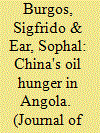

|
|
|
|
|
| Publication |
2012.
|
| Summary/Abstract |
China aims to secure, across the globe, the natural resources and raw materials needed to sustain the rapid economic growth in its manufacturing and industrial sectors. Among the many critical resources needed to fulfill its variegated energy needs, oil is by far the most important one given that it fuels its economic engine. Angola's vast oil reserves and flexible production levels make it a leading producer and exporter of crude oil. It quickly became a strategic oil supplier to China. In 2010, Angola supplied one-quarter of China's oil imports.
|
|
|
|
|
|
|
|
|
|
|
|
|
|
|
|
| 2 |
ID:
110012


|
|
|
|
|
| Publication |
2012.
|
| Summary/Abstract |
This article seeks to explain both China's motivations in, and South Korea's response to, the Koguryo controversy. It argues that it is necessary to take into account the role of national identity and domestic politics in explaining the controversy. China's claim is neither defensive nor offensive toward the two Koreas; rather, it is a logical consequence of a particular historiography in China that was developed in the twentieth century. Given the centrality of national identity construction in both countries, the conflict over Koguryo will be difficult to resolve in the future. To prevent future conflicts from reoccurring, both sides need to adopt a new perspective on history to move toward a shared history and cultural community.
|
|
|
|
|
|
|
|
|
|
|
|
|
|
|
|
| 3 |
ID:
110018


|
|
|
|
|
| Publication |
2012.
|
| Summary/Abstract |
Why does the EU-China partnership encounter so many problems? What are the causes of these problems? Can they be overcome? What kind of partners are the EU and China? Can the partnership be maintained despite the increasing problems? To answer these questions, the paper will first look at the differences between the EU and China in terms of history, economic development levels, their nation-building trajectories, and their understandings on some key concepts such as sovereignty. In the second section, the paper will then study their strategic visions, economic and trade cooperation, and climate change policies. It will then analyze the challenges in EU-China relations. While there is no doubt that both sides wish for stable bilateral cooperation, the different interests in many areas may interrupt development in one way or another. It is not easy for a genuine partnership to be established between the two.
|
|
|
|
|
|
|
|
|
|
|
|
|
|
|
|
| 4 |
ID:
110014
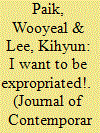

|
|
|
|
|
| Publication |
2012.
|
| Summary/Abstract |
This paper analyzes the 'Minor Property Housing' (XCQF) phenomenon. XCQF is an illegal residential building, constructed on rural collective land in suburban areas by a joint land development of township and village governments, land developers, and peasants for selling and renting to non-local urbanites. We argue that XCQF became a fait accompli not to be demolished nor legalized by higher authorities because the interests of lower-level governments and those non-elites converge. As a result, they jointly defy the central government and higher-level governments' land policies. It brings a rare opportunity for grassroots officials, entrepreneurs, and ordinary citizens to find a manner of co-existence, shaping this positive-sum coalition game unlike the near zero-sum game of other exploitative land developments. The XCQF phenomenon suggests that other patterns of coalition building, beyond what is in the current literature of 'rightful resistance', exist.
|
|
|
|
|
|
|
|
|
|
|
|
|
|
|
|
| 5 |
ID:
110016
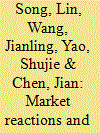

|
|
|
|
|
| Publication |
2012.
|
| Summary/Abstract |
This paper studies the market reactions to corporate philanthropic giving in response to the 12 May 2008 Wenchuan earthquake in Sichuan, China. Based on a sample of 136 Chinese listed companies, our results indicate a significant and positive seven-day cumulative abnormal rise in the share prices of those companies making donations compared to those not making donations. Both timeliness and the amount of philanthropic giving generate significant market reactions, confirming Godfrey's assertion that corporate philanthropy can be perceived as a genuine manifestation of firms' underlying desire to raise their market values. However, when the sample firms are divided into two groups, government controlled and non-government controlled, Godfrey's assertion is challenged by our empirical results which show different market responses to the two different types of companies.
|
|
|
|
|
|
|
|
|
|
|
|
|
|
|
|
| 6 |
ID:
110015
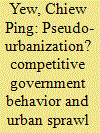

|
|
|
|
|
| Publication |
2012.
|
| Summary/Abstract |
Urban population size is a slippery indicator of China's urbanization level. Urban sprawl through infrastructure construction, the setting up of development zones and administrative adjustments, expands urban space and in turn inflates urban population size without necessarily urbanizing the overall landscape or economy. This article seeks to distinguish urbanization from urban sprawl. It aims to uncover why and how local governments have spurred urban sprawl and shaped urbanization in today's China. It suggests that urban sprawl is a land-centered process engineered by the government primarily to generate revenue for local coffers. City building has become a competitive enterprise for local governments who seek to outdo each other in 'place-making', both to attract investments and to conjure up highly visible trophy projects. The implications of these findings on China's urbanization and how urban sprawl may be further studied are addressed at the end of the article.
|
|
|
|
|
|
|
|
|
|
|
|
|
|
|
|
| 7 |
ID:
110013


|
|
|
|
|
| Publication |
2012.
|
| Summary/Abstract |
Corruption in the Chinese real estate (RE) industry is a very serious and prevalent issue. This article focuses on variations in Chinese RE corruption. It argues that due to an expansion of the official players at each step in the RE development process, corruption is an unintended consequence of the reform to regulate the industry. Despite the empowerment of local governments and bureaucracies, corruption has emerged in these entities, spreading from local people's governments to functional units, creating a chain of corrupt practices which includes groups of officials and large sums of money.
|
|
|
|
|
|
|
|
|
|
|
|
|
|
|
|
| 8 |
ID:
110017
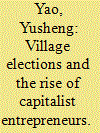

|
|
|
|
|
| Publication |
2012.
|
| Summary/Abstract |
This study examines a series of four direct elections and their impact in an industrialized Chinese northern village. It finds that direct elections empowered villagers and the new economic elite to remove the old, entrenched and corrupt leadership. However, the few capitalist entrepreneurs who dominated the elections and the new leadership neither abided by the rules of political competition nor tried to govern democratically. On the other hand, villagers did not feel empowered to participate in the governing process despite the establishment of democratic institutions. After initial enthusiasm for direct elections, many villagers either became politically apathetic or felt helpless and nostalgic for the return of a benevolent authoritarian leader. This study finds that after four rounds of direct elections, little progress had been made in democratic elections and governance. This was mainly because the new economic elite did not want to be checked by democratic rules and institutions while villagers had not learned to use democratic institutions to hold their elected leaders accountable.
|
|
|
|
|
|
|
|
|
|
|
|
|
|
|
|
| 9 |
ID:
110011
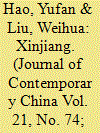

|
|
|
|
|
| Publication |
2012.
|
| Summary/Abstract |
The 5 July event in Urumqi inspired rethinking about Beijing's policy towards Xinjiang. This paper will examine Beijing's interests in Xinjiang from historical, political, economic and security perspectives, and the challenges Beijing faces in pursuing and protecting its interests. By examining the tensions between the Han and ethnic minorities, especially the Uyghurs in Xinjiang, the paper argues that the Xinjiang issue involves China's core interests and the most serious challenge Beijing faces is how to cope with ethnic tension in a highly sensitive region surrounded by big powers.
|
|
|
|
|
|
|
|
|
|
|
|
|
|
|
|
|
|
|
|
|